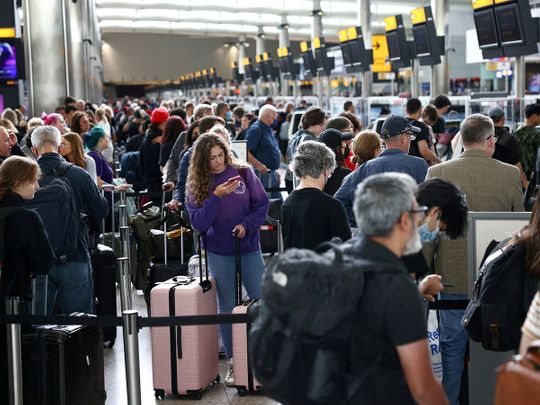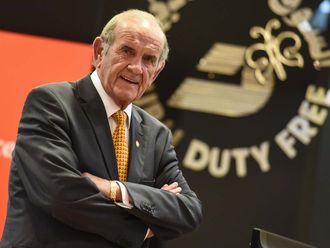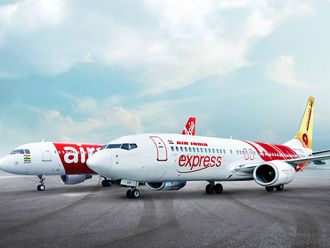
It's been a sizzling summer of travel, but this will likely be the peak of the post-pandemic boom. As longer nights start to draw in, the urge to splurge on pricey trips is bound to fade.
As it returned to profitability for the first time since the pandemic, TUI said bookings for this summer were up 6% from 2022. Yet although customers continue to spend more on their vacations, this is a slowdown from the 13% increase reported at the second quarter.
The world's biggest package-tour operator said this reflected three weeks of uncertainty amid a heat wave in parts of Europe and wildfires that raged in Rhodes last month. But there are signs elsewhere that our wanderlust is starting to wane.
In the U.S., Alaska Air, JetBlue, Frontier and Spirit Airlines - all carriers that primarily cater to North American markets - have warned that weaker demand in their home territory will weigh on fares and results this fall. The airlines all blamed a rapid shift in preference among Americans for international travel in the first full summer without substantive Covid restrictions since the beginning of the pandemic. The strong dollar is also helping boost the appeal of a holiday in Europe.
But there are growing concerns that this pullback isn't just about geographies, and that consumers are reining in spending amid high prices.
Airbnb said customers booked 115.1 million nights and experiences in the three months ending June 30. That was 11% ahead of the same period a year earlier, but the slowest pace of growth since the pandemic shutdowns. Destination Analysts, which has been polling American travelers for the past three years, found that while leisure trips remain a high priority, budgets are coming under pressure.
At Omni Hotels & Resorts, revenue per available room at a comparable set of hotels in the current quarter is trending to be flat relative to a year earlier, "or maybe down a little bit," President Kurt Alexander said. The company's portfolio of properties is primarily in the U.S., and rates are dropping at some of its leisure-oriented resorts as international travel markets siphon off demand. Customers are also less likely to splurge for suites or rooms with a view than they were in the recent past, which contributes to the pricing drag, Alexander said. Omni is using promotions to help fill rooms and expects to do so through the balance of the year.
Any softening in demand, though, is from an already elevated level, as consumers on both sides of the Atlantic made up for trips they were unable to take during Covid. The travel market isn't collapsing; Alexander of Omni said he sees a "plateau" in travel spending, rather than a serious retracing. But he points out that a plateau in demand can still squeeze margins, with wages across the company up about 25% relative to pre-pandemic levels. On the other hand, bookings for group events such as conferences or team-building gatherings in 2024 are up 20% relative to the demand Omni saw for 2023 at this point last year, Alexander said.
So far, Europe isn't following the U.S. pattern of a deceleration in short-haul trips. Low-cost carrier easyJet, for example, said recently it was still seeing robust demand. This reflects the typical seasonal summer getaway, as well as poor weather in the U.K. That may explain why Britain is the strongest of TUI's major markets.
The fires in Rhodes, although costing TUI 25 million ($27.4 million), don't seem to have dented consumers' desire to get away. Bookings were impacted for a short period but have rebounded.
However, the U.S. tends to be six to nine months ahead of Europe, implying a stabilization is still to come, particularly as higher mortgage costs take their toll. TUI said demand for long-haul trips in Germany had almost halved, and it would be prudent in its planning despite a promising start to the winter season.
Ryanair last month lowered its full-year traffic forecast and said it may need to cut ticket prices to fill seats this winter as consumers become more cost-sensitive. London's Heathrow airport is cautious on the outlook for leisure travel in the second half of the year, too. Yet French hotel group Accor upgraded its full-year profit guidance, while InterContinental Hotels said this week that it was seeing no slowdown in leisure travel in the U.S., where consumers often drive to its hotels.
The differing outlooks reflect the fact that not all consumers, market segments and geographies are feeling the same pressures. Older and wealthier consumers will still splash out most on holidays this year. And, of course, European hotel operators should also benefit from a resumption of Chinese tourism. It's just not clear whether these forces will be enough to sustain the industry.
For now, investors are giving airlines and tour operators the benefit of the doubt. TUI shares, for example, rose as much as 4% early Wednesday before giving up most of the gains. The Stoxx 600 Travel & Leisure Index is still up significantly, as is the S&P 500 Airlines Index, bolstered by the strong performance of more internationally inclined carriers such as Delta Air Lines and United Airlines.
But they should expect some turbulence as we move on from the era of revenge travel.












